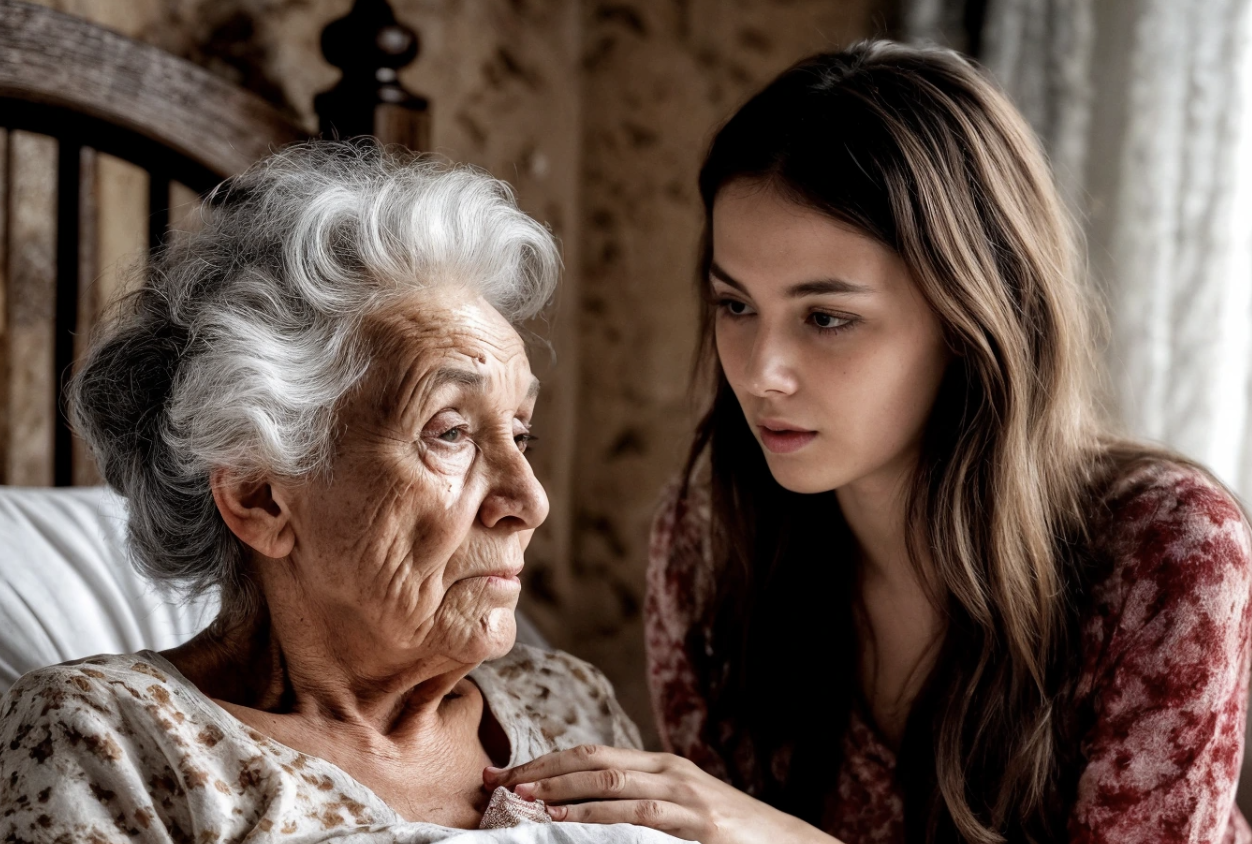I was taking revenge on you for my daughter. Instead of taking care of me personally, she preferred to hire strangers. She comes only once a month — just to hand over money. She pushed the grandchildren away from their grandmother, as if I were some shameful burden to be hidden far away. I hoped that if you left, she would finally reconcile with me…”
“Who is this again? A Moldovan woman? Oh Lord! Moldovans, Gypsies… Do you want this woman to steal from me?” — the old lady shouted when she saw me.
Yes, I came to the city from Moldova. I was twenty-seven, and our family had big problems: my mother was about to have a serious operation, and we were still paying off a mortgage. So I packed up and left to earn money. I set a deadline for myself — a year or a year and a half. Then I planned to return to a normal life.
Following the advice of my employer — 60-year-old Alevtina Alexandrovna — I began working as a caregiver for her mother, 84-year-old Vera Ivanovna. It was not easy. I helped her wash, did her hair, washed clothes, prepared diet meals, bought groceries and medicine. But the old woman remained cold, unfriendly, often rude.
Every morning it became harder to wake up and go to work. Lying in bed, I listened to Vera Ivanovna shifting, shuffling in her slippers, coughing, and cursing “that Moldovan idler.” The job was not for the weak. Besides constant nagging and mockery, I barely got any sleep. In the evenings, when the old lady went to bed, I cleaned the apartment, cooked in advance, or went to the night store — during the day she could not be left alone even for a minute.
Every day demanded enormous effort to stay. Only the thought of my family gave me the strength to continue.
But my patience ran out when after six months Vera Ivanovna claimed I had stolen five thousand rubles from her. I explained that I took nothing — I clean every day and would have noticed the bill.
“That’s exactly it!” she hissed. “You clean so often on purpose, to steal what I forget to hide!”
I was shocked. This woman had no desire to be fair. A real scandal began. She called her daughter, who came over, then called the police. After a search (especially thorough in my belongings), the money was found in her own purse. The police left, Alevtina left too, but Vera Ivanovna never apologized. She just remained silent, proud and haughty.
That incident was the last straw. I was running out of strength.
“I’m leaving,” I announced and began to pack my suitcase — clothes, documents scattered around the room where I lived.
“You want to quit a good city job?” she snorted, standing in the doorway. “And what about your life in Moldova? You’re poor there anyway.”
“I’ll manage,” I answered calmly. “There will be some kind of job. I’ll cope.”
“Then why did you even come if you’re afraid of difficulties?” she asked, curling her lip.
“To pay for my mother’s operation and repay the mortgage,” I blurted out, though I would never have shared that before. I was just nervous. “But I don’t want to stay here anymore. Let them pay less, but no one will call me a thief or humiliate me. Find yourself another helper. Pity her though…”
We stared at each other for a long time. She was shorter than me, thin, pale, covered in wrinkles. But her blue eyes could pierce even the most confident person. Yet now I was not afraid of her. It was over. I was leaving.
I was about to return to my suitcase when I heard her unexpectedly quiet question:
“Are you enduring all this to save your mother?”
Her words struck me to the core.
I expected another jab or mockery, but Vera Ivanovna’s voice sounded different. There was no longer scorn or arrogance — only surprise, almost confusion… and, it seemed to me, even regret.
“What’s strange about that?” I answered. “I’m her only daughter. Although ‘save’ is too strong a word. Mom just has cataracts, her vision is poor. But it’s treatable. The operation is simple, about thirty minutes under anesthesia — and that’s it.”
“Why not do it for free?” she asked. “Isn’t there state healthcare in your country?”
“There is, of course,” I nodded. “But the wait would be long. And I don’t want mom to give up her favorite things: reading, crosswords, books. Living with poor eyesight is hard. She worked all her life, toiled without rest. I want her to feel good now, at least in retirement…”
I stopped mid-sentence. I noticed tears glistening in the old lady’s eyes. She lowered her head, but the trembling shoulders showed she was crying. Suddenly, a sharp feeling of pity overwhelmed me. The resentment that had built up for so long vanished without a trace.
Carefully, I hugged her. I feared a new outburst of irritation. Vera Ivanovna tensed as if she wanted to break free, but then suddenly pressed her whole body to me. I was stunned! She sobbed uncontrollably.
“Forgive me,” she whispered after a long pause. “I was unfair. I don’t know what came over me… I’m not really so cruel…”
“It’s okay, it’s nothing,” I stroked her gray hair.
I felt a little awkward around this new, unexpectedly gentle woman. I wanted to lighten the mood:
“We just didn’t understand each other at first. Our relationship just didn’t work out, so to speak…”
“No, that’s not it!” she exclaimed, straightening up and freeing herself from my arms.
I feared an angry outburst, but Vera Ivanovna squeezed my hand tightly and, trembling slightly, said:
“I have to confess… I was taking revenge on you for my daughter. Alevtina prefers to hire caregivers rather than be near me. She comes only once a month — just to bring money. She pushed the grandchildren away as if I were some kind of plague, as if old age were shameful and disgusting. As if she needed to be hidden. Subconsciously, I hoped that if you gave up and left, Alevtina would finally accept me…”
So we cried together. After that day, our relationship changed radically. At first, we spoke cautiously, choosing words, then began telling each other about our lives. She shared memories — how she raised her daughter alone, how she fought for her future. I told about my strange long-distance marriage: my husband worked at construction in another city to pay off the apartment loan, and I was in the city. We didn’t have children yet because we couldn’t afford it. Though we wanted them very much.
Over time, we became close people. When I told her that my mother had a successful operation, Vera Ivanovna sincerely rejoiced. She asked how much more was left on the loan and even gave me a bonus so I could visit my husband for a few days.
But this unexpected friendship did not last long. Four months after our reconciliation, Vera Ivanovna passed away in her sleep. Quietly, peacefully.
When they took her away, I was cleaning the apartment, packing things and holding back tears. It felt like I had lost a close person.
Suddenly, there was a knock at the door. A worried Alevtina appeared, accompanied by a middle-aged man in a business suit — he introduced himself as the mother’s lawyer.
I tensed internally, expecting another accusation. But I heard something completely different:
“I must inform you about Vera Ivanovna’s will. You are bequeathed…” — and he named the sum.
It was exactly the amount I needed to close the mortgage!
“What tricks do you know to make my mother leave you so much money?” Alevtina spat angrily.
I looked at her in bewilderment.
“Tricks? I’ll show you them now!” I smiled and suddenly hugged her tightly.
She screamed in outrage, breaking free, and I went to call my husband — we had to urgently tell him we were coming home.



